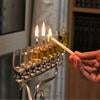The inspiring glow of the Menorah will be experienced in New Jersey state prisons for the first time, thanks to a new ruling announced this week by the New Jersey Department of Corrections.
“Our goal is to respect and accommodate religious traditions as best we can in our institutions,” said New Jersey’s Corrections Commissioner Gary Lanigan. “I am pleased that collaborative discussions between the Governor’s Office, the Corrections Department and leaders from New Jersey’s Jewish community have resulted in this pilot program.”
“This is a momentous change in policy,” said Rabbi Zalman Grossbaum, director of Chabad-Lubavitch of Livingston, New Jersey. “Having people be able to celebrate their traditions is an important part of their rehabilitation.”
The new pilot program authorizes a religious group volunteer or department of corrections staff member to light a menorah in a designated room, with inmates allowed to watch under staff supervision. It’s the result of a year-long effort that started on the first night of Chanukah last year, when attorney Roger Jacobs learned that a local county jail did not permit a menorah-lighting ceremony for its Jewish inmates.
By noon the next day, the New Jersey-based lawyer had resolved the issue with local authorities. Then came a request from Rabbi Grossbaum that Jacobs help out on the state prison system level, which affects some 55 Jewish prisoners in seven institutions around New Jersey. “Let’s see what we can do,” Jacobs said.
A year-long dialogue by telephone and letter between Jacobs, Grossbaum and New Jersey authorities led to the reversal of policy. “If it helps people who have been incarcerated connect with their belief system and their religion, and perhaps even brightens their day, then I think we’ve accomplished a real mitzvah,” said Jacobs.
Mendy Katz, director of outreach programs at the Florida-based Aleph Institute, which works with prisoners around the country, said that 45 states had allowed the lighting of menorahs in prisons, but “it’s the first time in New Jersey,” said Katz. “Each year a few more states are added.”
The light of the menorah can change the atmosphere and the mood for the prisoners beyond the holiday itself, Katz noted, with the potential to inspire them to bring more good into the world. Aleph will have volunteers in some 300 prisons around the country this Chanukah, who come ready to sing, dance, light the menorah and play dreidel. “I see how it lights up inmates’ lives,” said Katz.
“The Rebbe felt the lighting of the menorah in prison sends a very powerful message,” Katz continued, citing December 1978 comments from the Lubavitcher Rebbe, Rabbi Menachem Mendel Schneerson, of righteous memory, about the importance of a prisoner lighting Chanukah candles and its ability to lift his spirits. The Rebbe pushed for efforts to make it possible around the world.
In many cases, it can make a strong impression on prisoners to be able to fulfill their tradition on a holiday like Chanukah, said Grossbaum. “The holiday of Chanukah is the most celebrated holiday on the Jewish calendar, and for the prisoners who are not so religious, this is one of the few traditions they connect with. We are so pleased that we can bring some light and joy into their lives.”








Start a Discussion